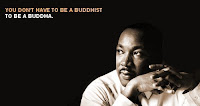

Statement of His Holiness the Dalai Lama of Tibet on 50th Anniversary of Tibetan National Uprising Day
Today is the fiftieth anniversary of the Tibetan people's peaceful uprising against Communist China's repression in Tibet. Since last March, widespread peaceful protests have erupted across the whole of Tibet. Most of the participants were youths born and brought up after 1959, who have not seen or experienced a free Tibet. However, the fact that they were driven by a firm conviction to serve the cause of Tibet that has continued from generation to generation is indeed a matter of pride. It will serve as a source of inspiration for those in the international community who take keen interest in the issue of Tibet. We pay tribute and offer our prayers for all those who died, were tortured and suffered tremendous hardships including during the crisis last year, for the cause of Tibet since our struggle began.
Around 1949, Communist forces began to enter north-eastern and eastern Tibet (Kham and Amdo) and by 1950, more than 5000 Tibetan soldiers had been killed. Taking the prevailing situation into account, the Chinese government chose a policy of peaceful liberation, which in 1951 led to the signing of the 17-Point Agreement and its annexure. Since then, Tibet has come under the control of the People's Republic of China. However, the Agreement clearly mentions that Tibet's distinct religion, culture and traditional values would be protected.
Between 1954 and 1955, I met with most of the senior Chinese leaders in the Communist Party, government and military, led by Chairman Mao Zedong, in Beijing. When we discussed ways of achieving the social and economic development of Tibet, as well as maintaining Tibet's religious and cultural heritage, Mao Zedong and all the other leaders agreed to establish a preparatory committee to pave the way for the implementation of the autonomous region, as stipulated in the Agreement, rather than establishing a military administrative commission. From about 1956 onwards, however, the situation took a turn for the worse with the imposition of ultra-leftist policies in Tibet. Consequently, the assurances given by higher authorities were not implemented on the ground. The forceful implementation of the so-called “democratic reform” in the Kham and Amdo regions of Tibet, which did not accord with prevailing conditions, resulted in immense chaos and destruction. In Central Tibet, Chinese officials forcibly and deliberately violated the terms of the 17-Point Agreement, and their heavy-handed tactics increased day by day. These desperate developments left the Tibetan people with no alternative but to launch a peaceful uprising on 10 March 1959. The Chinese authorities responded with unprecedented force that led to the killing, arrests and imprisonment of tens of thousands of Tibetans in the following months. Consequently, accompanied by a small party of Tibetan government officials including some Kalons (Cabinet Ministers), I escaped into exile in India. Thereafter, nearly a hundred thousand Tibetans fled into exile in India, Nepal and Bhutan. During the escape and the months that followed they faced unimaginable hardship, which is still fresh in Tibetan memory.
Having occupied Tibet, the Chinese Communist government carried out a series of repressive and violent campaigns that have included “democratic reform”, class struggle, communes, the Cultural Revolution, the imposition of martial law, and more recently the patriotic re-education and the strike hard campaigns. These thrust Tibetans into such depths of suffering and hardship that they literally experienced hell on earth. The immediate result of these campaigns was the deaths of hundreds of thousands of Tibetans. The lineage of the Buddha Dharma was severed. Thousands of religious and cultural centres such as monasteries, nunneries and temples were razed to the ground. Historical buildings and monuments were demolished. Natural resources have been indiscriminately exploited. Today, Tibet's fragile environment has been polluted, massive deforestation has been carried out and wildlife, such as wild yaks and Tibetan antelopes, are being driven to extinction.
These 50 years have brought untold suffering and destruction to the land and people of Tibet. Even today, Tibetans in Tibet live in constant fear and the Chinese authorities remain constantly suspicious of them. Today, the religion, culture, language and identity, which successive generations of Tibetans have considered more precious than their lives, are nearing extinction; in short, the Tibetan people are regarded like criminals deserving to be put to death. The Tibetan people's tragedy was set out in the late Panchen Rinpoche's 70,000-character petition to the Chinese government in 1962. He raised it again in his speech in Shigatse in 1989 shortly before he died, when he said that what we have lost under Chinese communist rule far outweighs what we have gained. Many concerned and unbiased Tibetans have also spoken out about the hardships of the Tibetan people. Even Hu Yaobang, the Communist Party Secretary, when he arrived in Lhasa in 1980, clearly acknowledged these mistakes and asked the Tibetans for their forgiveness. Many infrastructural developments such as roads, airports, railways, and so forth, which seem to have brought progress to Tibetan areas, were really done with the political objective of sinicising Tibet at the huge cost of devastating the Tibetan environment and way of life.
As for the Tibetan refugees, although we initially faced many problems such as great differences of climate and language and difficulties earning our livelihood, we have been successful in re-establishing ourselves in exile. Due to the great generosity of our host countries, especially India, Tibetans have been able to live in freedom without fear. We have been able to earn a livelihood and uphold our religion and culture. We have been able to provide our children with both traditional and modern education, as well as engaging in efforts to resolve the Tibet issue. There have been other positive results too. Greater understanding of Tibetan Buddhism with its emphasis on compassion has made a positive contribution in many parts of the world.
Immediately after our arrival in exile I began to work on the promotion of democracy in the Tibetan community with the establishment of the Tibetan Parliament-in-Exile in 1960. Since then, we have taken gradual steps on the path to democracy and today our exile administration has evolved into a fully functioning democracy with a written charter of its own and a legislative body. This is indeed something we can all be proud of.
Since 2001, we have instituted a system by which the political leadership of Tibetan exiles is directly elected through procedures similar to those in other democratic systems. Currently, the directly-elected Kalon Tripa's (Cabinet Chairperson) second term is underway. Consequently, my daily administrative responsibilities have reduced and today I am in a state of semi-retirement. However, to work for the just cause of Tibet is the responsibility of every Tibetan, and as long as I live I will uphold this responsibility.
As a human being, my main commitment is in the promotion of human values; this is what I consider the key factor for a happy life at the individual, family and community level. As a religious practitioner, my second commitment is the promotion of inter-religious harmony. My third commitment is of course the issue of Tibet. This is firstly due to my being a Tibetan with the name of 'Dalai Lama'; more importantly, it is due to the trust that Tibetans both inside and outside Tibet have placed in me. These are the three important commitments, which I always keep in mind.
In addition to looking after the well being of the exiled Tibetan community, which they have done quite well, the principal task of the Central Tibetan Administration has been to work towards the resolution of the issue of Tibet. Having laid out the mutually beneficial Middle-Way policy in 1974, we were ready to respond to Deng Xiaoping when he proposed talks in 1979. Many talks were conducted and fact-finding delegations dispatched. These however, did not bear any concrete results and formal contacts eventually broke off in 1993.
Subsequently, in 1996-97, we conducted an opinion poll of the Tibetans in exile, and collected suggestions from Tibet wherever possible, on a proposed referendum, by which the Tibetan people were to determine the future course of our freedom struggle to their full satisfaction. Based on the outcome of the poll and the suggestions from Tibet, we decided to continue the policy of the Middle-Way.
Since the re-establishment of contacts in 2002, we have followed a policy of one official channel and one agenda and have held eight rounds of talks with the Chinese authorities. As a consequence, we presented a Memorandum on Genuine Autonomy for the Tibetan People, explaining how the conditions for national regional autonomy as set forth in the Chinese constitution would be met by the full implementation of its laws on autonomy. The Chinese insistence that we accept Tibet as having been a part of China since ancient times is not only inaccurate, but also unreasonable. We cannot change the past no matter whether it was good or bad. Distorting history for political purposes is incorrect.
We need to look to the future and work for our mutual benefit. We Tibetans are looking for a legitimate and meaningful autonomy, an arrangement that would enable Tibetans to live within the framework of the People's Republic of China. Fulfilling the aspirations of the Tibetan people will enable China to achieve stability and unity. From our side, we are not making any demands based on history. Looking back at history, there is no country in the world today, including China, whose territorial status has remained forever unchanged, nor can it remain unchanged.
Our aspiration that all Tibetans be brought under a single autonomous administration is in keeping with the very objective of the principle of national regional autonomy. It also fulfils the fundamental requirements of the Tibetan and Chinese peoples. The Chinese constitution and other related laws and regulations do not pose any obstacle to this and many leaders of the Chinese Central Government have accepted this genuine aspiration. When signing the 17-Point Agreement, Premier Zhou Enlai acknowledged it as a reasonable demand. In 1956, when establishing the Preparatory Committee for the “Tibet Autonomous Region”, Vice-Premier Chen Yi pointing at a map said, if Lhasa could be made the capital of the Tibet Autonomous Region, which included the Tibetan areas within the other provinces, it would contribute to the development of Tibet and friendship between the Tibetan and Chinese nationalities, a view shared by the Panchen Rinpoche and many Tibetan cadres and scholars. If Chinese leaders had any objections to our proposals, they could have provided reasons for them and suggested alternatives for our consideration, but they did not. I am disappointed that the Chinese authorities have not responded appropriately to our sincere efforts to implement the principle of meaningful national regional autonomy for all Tibetans, as set forth in the constitution of the People's Republic of China.
Quite apart from the current process of Sino-Tibetan dialogue having achieved no concrete results, there has been a brutal crackdown on the Tibetan protests that have shaken the whole of Tibet since March last year. Therefore, in order to solicit public opinion as to what future course of action we should take, the Special Meeting of Tibetan exiles was convened in November 2008. Efforts were made to collect suggestions, as far as possible, from the Tibetans in Tibet as well. The outcome of this whole process was that a majority of Tibetans strongly supported the continuation of the Middle-Way policy. Therefore, we are now pursuing this policy with greater confidence and will continue our efforts towards achieving a meaningful national regional autonomy for all Tibetans.
From time immemorial, the Tibetan and Chinese peoples have been neighbours. In future too, we will have to live together. Therefore, it is most important for us to co-exist in friendship with each other.
Since the occupation of Tibet, the Communist China has been publishing distorted propaganda about Tibet and its people. Consequently, there are, among the Chinese populace, very few people who have a true understanding about Tibet. It is, in fact, very difficult for them to find the truth. There are also ultra-leftist Chinese leaders who have, since last March, been undertaking a huge propaganda effort with the intention of setting the Tibetan and Chinese peoples apart and creating animosity between them. Sadly, as a result, a negative impression of Tibetans has arisen in the minds of some of our Chinese brothers and sisters. Therefore, as I have repeatedly appealed before, I would like once again to urge our Chinese brothers and sisters not to be swayed by such propaganda, but, instead, to try to discover the facts about Tibet impartially, so as to prevent divisions among us. Tibetans should also continue to work for friendship with the Chinese people.
Looking back on 50 years in exile, we have witnessed many ups and downs. However, the fact that the Tibet issue is alive and the international community is taking growing interest in it is indeed an achievement. Seen from this perspective, I have no doubt that the justice of Tibet's cause will prevail, if we continue to tread the path of truth and non-violence.
As we commemorate 50 years in exile, it is most important that we express our deep gratitude to the governments and peoples of the various host countries in which we live. Not only do we abide by the laws of these host countries, but we also conduct ourselves in a way that we become an asset to these countries. Similarly, in our efforts to realise the cause of Tibet and uphold its religion and culture, we should craft our future vision and strategy by learning from our past experience.
I always say that we should hope for the best, and prepare for the worst. Whether we look at it from the global perspective or in the context of events in China, there are reasons for us to hope for a quick resolution of the issue of Tibet. However, we must also prepare ourselves well in case the Tibetan struggle goes on for a long time. For this, we must focus primarily on the education of our children and the nurturing of professionals in various fields. We should also raise awareness about the environment and health, and improve understanding and practice of non-violent methods among the general Tibetan population.
I would like to take this opportunity to express my heartfelt gratitude to the leaders and people of India, as well as its Central and State Governments, who despite whatever problems and obstacles they face, have provided invaluable support and assistance over the past 50 years to Tibetans in exile. Their kindness and generosity are immeasurable. I would also like to express my gratitude to the leaders, governments and people of the international community, as well as the various Tibet Support Groups, for their unstinting support.
May all sentient beings live in peace and happiness.
The Dalai Lama
10 March 2009









































